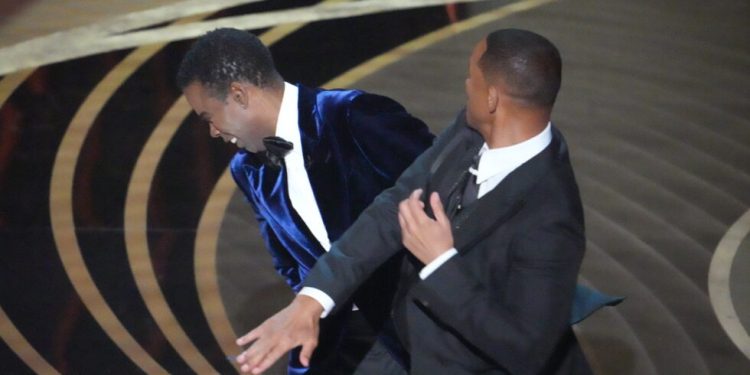Advertisement
In less than 24 hours since superstar Will Smith permanently destroyed his public image by slapping Chris Rock, the man only half his size, the crypto market launched two projects to bring the event to the blockchain. Although cryptocurrencies and The Slap Heard Round The World have no logical connection to each other, the newly released digital assets still seem to be hotly traded.
But does this mean you should also get involved? Absolutely not!
Buzzfeed's Katie Notoupolos on Monday discovered what's known as the "Will Smith Slap DAO" (SlapDAO) selling NFT on the OpenSea market. And a token called "Will Smith Inu" has been traded on UniSwap and other decentralized exchanges. Will Smith Inu saw a rapid price increase overnight, and attracted about $1.9 million in transaction value.
While this number isn't too big, it's enough to make you wonder questions like: Why could this happen? Why would anyone buy them? Why would Will Smith approve of this?
In fact, if you think these projects are legal or investmentable, it's time to sit back and think about the basics of crypto knowledge.
The most important thing to remember: Anyone can create a token and give it any name, say what they want about it, and they'll probably never get in trouble.
Ethereum, Binance Smart Chain and other cryptocurrency systems have the tools to create sub-tokens quickly (like ERC-20 or BEP-20). They have no inherent value, and may only take a few minutes to release a "new project" that involves a public figure or a cultural event.
Similar to 2014, Coinye West was released without any association with rapper Kanye West. More recently, the "Squid Game Token" coin debuted to monetize Netflix's blockbuster, and variations of "Dogelon Mars" or "Elon Doge" monetized the infamous coin of Tesla CEO Elon Musk.
Because the cryptocurrency market is global and you can sell any token on decentralized exchanges, these shallow scams can also garner a large amount of transactions. But basically, they are scams and most will collapse quickly.
As for Kanye West, he was quick to sue the Coinye project. But these projects will often collapse on their own. Just as Squid Game token disappeared after a few days of price increases because the "developers" gave it up – a move "over the drawbridge" was not a surprise. So Will Smith's slap projects will have the same fate.
The lesson learned here is simple but also important for newcomers in the field: Not all cryptocurrencies created are the same. And while novelty and hotness can be positive properties in many areas, it's often a bad thing in cryptocurrencies. That's because of the Lindy effect, a theory of investing that the longer something lasts, the longer it will last. New cryptocurrencies as well as new companies have a very high failure rate.

Memes don't make sense.
But it is also necessary to distinguish between "memes" and "token memes", they are very different things.
Overall, "memes" have a big impact on cryptocurrencies. But memes are communication tools, they themselves are not a valuable asset or an advantage to sell. Good memes in cryptocurrencies are a combination of the most complex ideas. "Bitcoin Maximalism" is a simple meme – "Bitcoin (BTC) will dominate every currency." It symbolizes much more complex arguments about the application of a neutral digital currency class, and bitcoin's special place in it.
And for the opposite of it are bad memes that have two main types. There are memes that represent more different ideas but are fundamentally wrong ("XRP is the norm"). There are also coin memes without any insightful messages, simply attaching an eye-catching image and a slogan to the token created in an open source algorithm. Dogecoin (DOGE), shiba inu (SHIB), Coinye West and SlapDAO all fall into this category.
SlapDAO, like the empty tokens above, is also self-aware of its own ephemerality. It includes poor-quality shots from multiple angles of Will Smith's slapstick, which is laced with stupid slogans. Although I have to say, it's pretty funny.
But no matter how ironic a project might be, the proceeds are real: According to OpenSea, Will Smith SlapDAO sold 13.3 ETH in less than 24 hours. That's more than $40,000 at current prices — pretty good for a short-term project because the figure isn't big enough to conduct an investigation.
At the same time, these numbers can also be a form of "wash trading" to create the impression that the market is very attractive and trick traders into buying them. The laundering transaction is incredibly simple – you just need to use your prestigious cryptocurrency (BTC, ETH) to buy a fake crypto asset, usually from a new wallet without the obvious source of the money. This fake sale can create awareness for the market of the "standard" price for your inexpensive property and trick the buyers afterwards.
Laundering and other forms of manipulation are extremely common in cryptocurrencies, especially in new or unknown projects. There are a few systematic and reliable ways to prevent or detect them. LooksRare, an NFT platform trying to challenge OpenSea's dominance, appears to have made a series of wash-up deals.
Meme trading games often try to create a short wave, sometimes high prices can only last for a few hours or even minutes before they collapse forever. You won't want to trade with self-proclaimed "degens" who try to catch these waves: they pride themselves on their obsessions, lack of sleep, and lunacy.
A simple lesson here is this: Anyone can create a token and they can call it by any name. They can also put it on a Decentralized exchange without permission or approval from others. They can then buy their own tokens from another of their wallets, creating the impression that there is a large demand source. Keep these things in mind when making any cryptocurrency transactions.
















